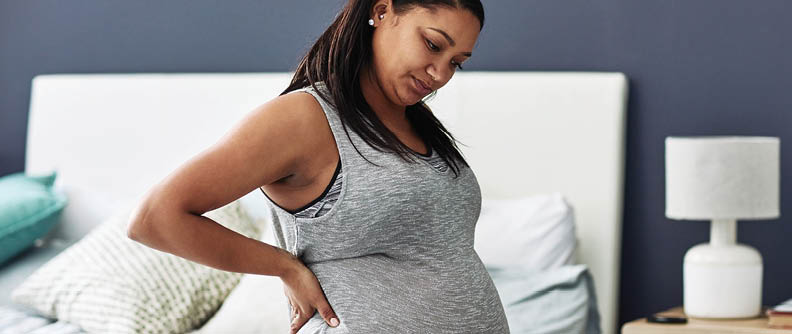As you approach your third trimester of pregnancy, you might experience uncomfortable or bothersome symptoms such as aches and pains, swollen feet and ankles, urine leaks, and vaginal discharge. Here are a few steps you can take to deal with them, as well as some more serious signs that you should contact your care team.
Aches and pains
It’s very common to have discomfort in your lower back or hip as your baby grows. You might also experience achy or sharp, shooting sensations low in your pelvis, which is called round ligament pain.
To treat this discomfort, you can try modifying how you walk or using a pregnancy belt to provide extra support. Also try getting moderate exercise, especially walking and gentle stretching. It can also help to change positions slowly and avoid quick, repetitive movements. If you need to, you can take acetaminophen, which is found in pain relievers such as Tylenol.* It’s a safe and effective option during pregnancy.
Sometimes, pregnant people can get leg cramps. If this happens to you, try relieving the pain by straightening your legs and flexing your ankle, like you’re trying to reach your toes up toward your shins.
Swollen feet and ankles
Extra fluid in your body during pregnancy can cause swollen feet and ankles, especially at the end of the day.
You can try getting some relief by putting your feet up when you’re resting. It might also help to sleep with your feet raised a little higher than your heart. Put a blanket or pillows under your lower legs when you're resting or sleeping.
You should avoid diuretics (water pills), but there are steps you can take to help minimize swelling. While you’re pregnant, be sure to:
- Skip salty foods like potato chip, and avoid adding extra salt to your foods
- Try not to stand for long periods without rest periods
- Drink plenty of water (at least 8 to 10 glasses every day)
- Avoid tight shoes
- Take short walks, especially if you are sitting for stretches of time
- Wear compression stockings
- Cool your feet in a bucket of cold water or use ice packs
Urine leaks
Many pregnant people have urine leakage while laughing or coughing, especially as the uterus gets bigger and puts more pressure on your bladder.
If you’re concerned about this, Kegel exercises can help strengthen your pelvic floor muscles. Tighten the muscles you’d use to stop the flow of urine. Then, slowly release those same muscles. You can do this while standing or sitting, but don’t practice while using the toilet. This might strain the pelvic muscles or prevent your bladder from completely emptying, which can lead to urinary tract infections.
It’s important to keep drinking fluids. Restricting fluids will not stop leaking and might lead to early labor.
Vaginal discharge
You might notice an increase in vaginal discharge while you’re pregnant. This is completely normal. Simply use warm water to clean the area, and wear panty liners if you wish. Don't use douches or special vaginal washes. If the discharge causes burning or itching, is blood-tinged, or has a bad odor, contact your care team.
When to contact your doctor
While most of these issues aren't dangerous, be sure to let your care team know right away if you have any of the following symptoms:
- Aches and pains that aren’t helped by acetaminophen
- Severe headaches or vision changes
- The need to use a pad to keep your underwear dry. This can be a sign that your fluid-filled amniotic sac, which is where the fetus is held for protection, has ruptured.
